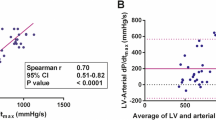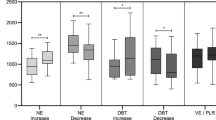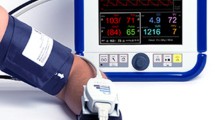Abstract
Purpose
Left ventricular (LV) performance is often quantified by echocardiography in critically ill patients. Pulse wave analysis (PWA) systems can also monitor cardiac function but in a continuous fashion. We compared echocardiographic and PWA-derived indices of LV function.
Methods
We enrolled 70 critically ill patients equipped with invasive arterial pressure monitoring who required echocardiography. We simultaneously assessed LV ejection fraction (LVEF), the rate of LV pressure rise during systole (dP/dt MAX) obtained with echocardiography (EC-dP/dt MAX), the ratio of effective arterial elastance to LV end-systolic elastance (E a/E es) determined by echocardiography, the dP/dt MAX estimated from the arterial pressure waveform (AP-dP/dt MAX) and the cardiac cycle efficiency (CCE) using PWA.
Results
Mean LVEF was 53 ± 18 % and CCE 0.16 ± 0.26. CCE was correlated linearly with LVEF (r = 0.88, 95 % CI 0.81 to 0.92, P < 0.001), and the dP/dt MAX values from the two techniques were linearly correlated (r = 0.93, 95 % CI 0.87 to 0.96, P < 0.001). There was minimal bias between the techniques for measurement of dP/dt MAX (23.7 mmHg/ms; 95 % CI −23.6 to 71.0). E a/E es and CCE were inversely correlated (r = −0.81, 95 % CI −0.88 to −0.71, P < 0.001). A CCE value of <0.07 predicted LVEF <40 % with a sensitivity of 0.93 and a specificity of 0.96 (AUC 0.98, 95 % CI 0.90 to 1.0, P < 0.001). A CCE value of >0.12 predicted LVEF ≥50 % with a sensitivity of 0.96 and a specificity of 0.82 (AUC 0.94, 95 % CI 0.87 to 1.0, P < 0.001). A CCE value <0.12 predicted E a/E es ≥1.3 with a sensitivity of 0.93 and a specificity of 0.89 (AUC 0.94, 95 % CI 0.83 to 1.0, P < 0.001).
Conclusions
PWA-derived variables provide relevant information on cardiac contractility and performance in critically ill patients. PWA provides an easy method for online hemodynamic evaluation in critically ill patients.




Similar content being viewed by others
References
Dittoe N, Stultz D, Schwartz BP, Hahn HS (2007) Quantitative left ventricular systolic function: from chamber to myocardium. Crit Care Med 35:S330–S339
Kirkpatrick JN, Vannan MA, Narula J, Lang RM (2007) Echocardiography in heart failure: applications, utility, and new horizons. J Am Coll Cardiol 50:381–396
De Backer D (2011) Evaluation of left ventricular systolic function. In: De Backer D, Cholley BP, Slama M, Vieillard-Baron A, Vignon P (eds) Hemodynamic monitoring using echocardiography in the critically Ill. Springer, Heidelberg, pp 79–89
Robotham JL, Takata M, Berman M, Harasawa Y (1991) Ejection fraction revisited. Anesthesiology 74:172–183
Chantler PD, Lakatta EG, Najjar SS (2008) Arterial-ventricular coupling: mechanistic insights into cardiovascular performance at rest and during exercise. J Appl Physiol 105:1342–1351
Sagawa K, Suga H, Shoukas AA, Bakalar KM (1977) End-systolic pressure/volume ratio: a new index of ventricular contractility. Am J Cardiol 40:748–753
Burkhoff D, de Tombe PP, Hunter WC, Kass DA (1991) Contractile strength and mechanical efficiency of left ventricle are enhanced by physiological afterload. Am J Physiol 260:H569–H578
Chen CH, Fetics B, Nevo E, Rochitte CE, Chiou KR, Ding PA, Kawaguchi M, Kass DA (2001) Noninvasive single-beat determination of left ventricular end-systolic elastance in humans. J Am Coll Cardiol 38:2028–2034
Cariou A, Pinsky MR, Monchi M, Laurent I, Vinsonneau C, Chiche JD, Charpentier J, Dhainaut JF (2008) Is myocardial adrenergic responsiveness depressed in human septic shock? Intensive Care Med 34:917–922
Little WC (1985) The left ventricular dP/dtmax-end-diastolic volume relation in closed-chest dogs. Circ Res 56:808–815
Bargiggia GS, Bertucci C, Recusani F, Raisaro A, De Servi S, Valdes-Cruz LM, Sahn DJ, Tronconi L (1989) A new method for estimating left ventricular dP/dt by continuous wave Doppler-echocardiography. Validation studies at cardiac catheterization. Circulation 80:1287–1292
Jabot J, Monnet X, Bouchra L, Chemla D, Richard C, Teboul JL (2009) Cardiac function index provided by transpulmonary thermodilution behaves as an indicator of left ventricular systolic function. Crit Care Med 37:2913–2918
Romano SM, Pistolesi M (2002) Assessment of cardiac output from systemic arterial pressure in humans. Crit Care Med 30:1834–1841
Romagnoli S, Romano SM, Bevilacqua S, Lazzeri C, Gensini GF, Pratesi C, Quattrone D, Dini D, De Gaudio AR (2011) Dynamic response of liquid-filled catheter systems for measurement of blood pressure: precision of measurements and reliability of the pressure recording analytical method with different disposable systems. J Crit Care 26:415–422
Romano SM, Olivotto I, Chiostri M, Giglioli C, Margheri M, Gensini GF (2006) Minimally invasive and noninvasive hemodynamic monitoring of the cardiovascular system: available options and future perspectives. Curr Cardiol Rev 2:37–39
Gelsomino S, Luca F, Renzulli A, Rubino AS, Romano SM, van der Veen FH, Carella R, Maessen JG, Gensini GF, Lorusso R (2011) Increased coronary blood flow and cardiac contractile efficiency with intraaortic balloon counterpulsation in a porcine model of myocardial ischemia-reperfusion injury. ASAIO J 57:375–381
Romano SM (2012) Cardiac cycle efficiency: a new parameter able to fully evaluate the dynamic interplay of the cardiovascular system. Int J Cardiol 155:326–327
Scolletta S, Ranaldi G, Carlucci F, Franchi F, Romano SM, Biagioli B (2010) Relationship between N-terminal pro-B-type natriuretic peptide (Nt-proBNP) and cardiac cycle efficiency in cardiac surgery. Biomed Pharmacother 64:511–515
Lang RM, Bierig M, Devereux RB, Flachskampf FA, Foster E, Pellikka PA, Picard MH, Roman MJ, Seward J, Shanewise JS, Solomon SD, Spencer KT, Sutton MS, Stewart WJ (2005) Recommendations for chamber quantification: a report from the American Society of Echocardiography’s Guidelines and Standards Committee and the Chamber Quantification Writing Group, developed in conjunction with the European Association of Echocardiography, a branch of the European Society of Cardiology. J Am Soc Echocardiogr 18:1440–1463
Kelly RP, Ting CT, Yang TM, Liu CP, Maughan WL, Chang MS, Kass DA (1992) Effective arterial elastance as index of arterial vascular load in humans. Circulation 86:513–521
Burkhoff D, Sagawa K (1986) Ventricular efficiency predicted by an analytical model. Am J Physiol 250:R1021–R1027
Nevo E, Marmor M, Lanir Y, Weiss TA, Marmor A (1995) A new methodology for non-invasive clinical assessment of cardiovascular system performance and of ventricular-arterial coupling during stress. Heart Vessels 10:24–34
Cohen-Solal A, Faraggi M, Czitrom D, Le Guludec D, Delahaye N, Gourgon R (1998) Left ventricular-arterial system coupling at peak exercise in dilated nonischemic cardiomyopathy. Chest 113:870–877
Kleinman B, Powell S, Kumar P, Gardner RM (1992) The fast flush test measures the dynamic response of the entire blood pressure monitoring system. Anesthesiology 77:1215–1220
Gardner RM (1981) Direct blood pressure measurement – dynamic response requirements. Anesthesiology 54:227–236
Scolletta S, Taccone FS, Romagnoli S, Landoni G, Giomarelli P (2011) Pressure recording analytical method to measure cardiac output after cardiac surgery: some practical considerations. Br J Anaesth 107:814–815
Bland JM, Altman DG (1986) Statistical methods for assessing agreement between two methods of clinical measurement. Lancet 1:307–310
Critchley LA, Critchley JA (1999) A meta-analysis of studies using bias and precision statistics to compare cardiac output measurement techniques. J Clin Monit Comput 15:85–91
Vieillard-Baron A, Charron C, Chergui K, Peyrouset O, Jardin F (2006) Bedside echocardiographic evaluation of hemodynamics in sepsis: is a qualitative evaluation sufficient? Intensive Care Med 32:1547–1552
Antonini-Canterin F, Enache R, Popescu BA, Popescu AC, Ginghina C, Leiballi E, Piazza R, Pavan D, Rubin D, Cappelletti P, Nicolosi GL (2009) Prognostic value of ventricular-arterial coupling and B-type natriuretic peptide in patients after myocardial infarction: a five-year follow-up study. J Am Soc Echocardiogr 22:1239–1245
Kass DA, Maughan WL, Guo ZM, Kono A, Sunagawa K, Sagawa K (1987) Comparative influence of load versus inotropic states on indexes of ventricular contractility: experimental and theoretical analysis based on pressure–volume relationships. Circulation 76:1422–1436
Choong CY, Herrmann HC, Weyman AE, Fifer MA (1987) Preload dependence of Doppler-derived indexes of left ventricular diastolic function in humans. J Am Coll Cardiol 10:800–808
Nichols WW, O’Rourke MF (2005) McDonald’s blood flow in arteries: theoretic, experimental, and clinical principles, 5th edn. Hodder Arnold, New York
Tartiere JM, Logeart D, Beauvais F, Chavelas C, Kesri L, Tabet JY, Cohen-Solal A (2007) Non-invasive radial pulse wave assessment for the evaluation of left ventricular systolic performance in heart failure. Eur J Heart Fail 9:477–483
De Hert SG, Robert D, Cromheecke S, Michard F, Nijs J, Rodrigus IE (2006) Evaluation of left ventricular function in anesthetized patients using femoral artery dP/dt(max). J Cardiothorac Vasc Anesth 20:325–330
Suzuki H, Shimano M, Yoshida Y, Inden Y, Muramatsu T, Tsuji Y, Tsuboi N, Hirayama H, Shibata R, Murohara T (2010) Maximum derivative of left ventricular pressure predicts cardiac mortality after cardiac resynchronization therapy. Clin Cardiol 33:E18–E23
Kolias TJ, Aaronson KD, Armstrong WF (2000) Doppler-derived dP/dt and -dP/dt predict survival in congestive heart failure. J Am Coll Cardiol 36:1594–1599
Tartière JM, Tabet JY, Logeart D, Tartière-Kesri L, Beauvais F, Chavelas C, Cohen Solal A (2008) Noninvasively determined radial dP/dt is a predictor of mortality in patients with heart failure. Am Heart J 155:758–763
Thiele RH, Durieux ME (2011) Arterial waveform analysis for the anesthesiologist: past, present, and future concepts. Anesth Analg 113:766–776
Bergenzaun L, Gudmundsson P, Ohlin H, During J, Ersson A, Ihrman L, Willenheimer R, Chew MS (2011) Assessing left ventricular systolic function in shock: evaluation of echocardiographic parameters in intensive care. Crit Care 15:R200
Schiller NB (2003) Ejection fraction by echocardiography: the full monty or just a peep show? Am Heart J 146:380–382
Mock MB, Ringqvist I, Fisher LD, Davis KB, Chaitman BR, Kouchoukos NT, Kaiser GC, Alderman E, Ryan TJ, Russell RO Jr, Mullin S, Fray D, Killip T III (1982) Survival of medically treated patients in the coronary artery surgery study (CASS) registry. Circulation 66:562–568
The Multicenter Postinfarction Group (1983) Risk stratification and survival after myocardial infarction. N Engl J Med 309:331–336
Pilote L, Silberberg J, Lisbona R, Sniderman A (1989) Prognosis in patients with low left ventricular ejection fraction after myocardial infarction. Importance of exercise capacity. Circulation 80:1636–1641
Suga H (2003) Cardiac energetics: from E(max) to pressure–volume area. Clin Exp Pharmacol Physiol 30:580–585
Little WC, Pu M (2009) Left ventricular-arterial coupling. J Am Soc Echocardiogr 22:1246–1248
Sunagawa K, Maughan WL, Burkhoff D, Sagawa K (1983) Left ventricular interaction with arterial load studied in isolated canine ventricle. Am J Physiol 245:H773–H780
Starling MR (1993) Left ventricular-arterial coupling relations in the normal human heart. Am Heart J 125:1659–1666
Asanoi H, Sasayama S, Kameyama T (1989) Ventriculoarterial coupling in normal and failing heart in humans. Circ Res 65:483–493
Prabhu SD (2007) Altered left ventricular-arterial coupling precedes pump dysfunction in early heart failure. Heart Vessels 22:170–177
Gibbs NC, Gardner RM (1988) Dynamics of invasive pressure monitoring systems: clinical and laboratory evaluation. Heart Lung 17:43–51
Camporota L, Beale R (2010) Pitfalls in haemodynamic monitoring based on the arterial pressure waveform. Crit Care 14:124
Vincent JL, Rhodes A, Perel A, Martin GS, Della RG, Vallet B, Pinsky MR, Hofer CK, Teboul JL, de Boode WP, Scolletta S, Vieillard-Baron A, De BD, Walley KR, Maggiorini M, Singer M (2011) Clinical review: update on hemodynamic monitoring – a consensus of 16. Crit Care 15:229
Maj G, Monaco F, Landoni G, Barile L, Nicolotti D, Pieri M, Melisurgo G, Pappalardo F, Zangrillo A (2011) Cardiac index assessment by the pressure recording analytic method in unstable patients with atrial fibrillation. J Cardiothorac Vasc Anesth 25:476–480
Hatib F, Jansen JR, Pinsky MR (2011) Peripheral vascular decoupling in porcine endotoxic shock. J Appl Physiol 111:853–860
Acknowledgments
We wish to thank Vygon Health (Padua, Italy) for kindly providing the Most Care device, but all other costs were covered by departmental funds only.
Conflicts of interest
S. Scolletta has received lecture fees and material for studies from Vygon, and grants and material for studies from Edwards Lifesciences; D. De Backer has received honoraria for lectures and grants for studies from Edwards Lifesciences. The other authors declare they have no conflicts of interest related to this article.
Author information
Authors and Affiliations
Corresponding author
Electronic supplementary material
Below is the link to the electronic supplementary material.
Rights and permissions
About this article
Cite this article
Scolletta, S., Bodson, L., Donadello, K. et al. Assessment of left ventricular function by pulse wave analysis in critically ill patients. Intensive Care Med 39, 1025–1033 (2013). https://doi.org/10.1007/s00134-013-2861-8
Received:
Accepted:
Published:
Issue Date:
DOI: https://doi.org/10.1007/s00134-013-2861-8




